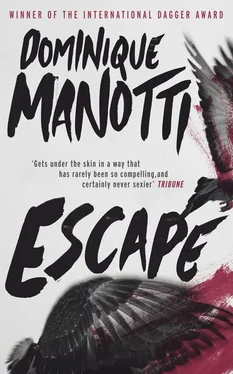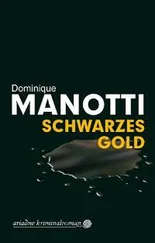Dominique Manotti - Escape
Здесь есть возможность читать онлайн «Dominique Manotti - Escape» весь текст электронной книги совершенно бесплатно (целиком полную версию без сокращений). В некоторых случаях можно слушать аудио, скачать через торрент в формате fb2 и присутствует краткое содержание. Год выпуска: 2014, ISBN: 2014, Издательство: Arcadia Books Limited, Жанр: Криминальный детектив, на английском языке. Описание произведения, (предисловие) а так же отзывы посетителей доступны на портале библиотеки ЛибКат.
- Название:Escape
- Автор:
- Издательство:Arcadia Books Limited
- Жанр:
- Год:2014
- ISBN:9781909807747
- Рейтинг книги:4 / 5. Голосов: 1
-
Избранное:Добавить в избранное
- Отзывы:
-
Ваша оценка:
- 80
- 1
- 2
- 3
- 4
- 5
Escape: краткое содержание, описание и аннотация
Предлагаем к чтению аннотацию, описание, краткое содержание или предисловие (зависит от того, что написал сам автор книги «Escape»). Если вы не нашли необходимую информацию о книге — напишите в комментариях, мы постараемся отыскать её.
Escape — читать онлайн бесплатно полную книгу (весь текст) целиком
Ниже представлен текст книги, разбитый по страницам. Система сохранения места последней прочитанной страницы, позволяет с удобством читать онлайн бесплатно книгу «Escape», без необходимости каждый раз заново искать на чём Вы остановились. Поставьте закладку, и сможете в любой момент перейти на страницу, на которой закончили чтение.
Интервал:
Закладка:
‘Can we meet Filippo tomorrow instead of tonight? Are you free?’
Cristina pulls a face.
‘On one condition. You come and sleep at my place tonight. I’m scared to go back to my apartment on my own in case I find myself face to face with either Filippo or a stranger, which would be just as bad. And I’ve had enough of the hotel.’
‘OK, we’ll figure something out.’
A dozen Italian refugees gather at the law firm’s offices, all very shaken. They hadn’t spotted any warning signs of this wave of arrests, which at first sight seem utterly baffling. The lawyers give some preliminary information.
‘It’s not good news. All three are in prison right now.’
Chiara groans. Giovanni nudges her thoughtlessly.
‘That’ll teach all of you in Lotta Continua. You’ve preached at us often enough. We’ve brought everything that has happened down on ourselves. We should never have taken up arms. Maybe now you’ll understand how the Italian state operates. And not be so smart.’
Chiara, on the brink of tears, turns away from him and speaks to the lawyers.
‘Charged with what, exactly?’
‘Sofri and Pietrostefani with being behind the assassination of Luigi Calabresi. Bompressi charged with assassinating him.’
‘In 1972! And they haven’t woken up till now…’
‘That’s not all. They are also accused of committing a string of bank robberies since the ’70s.’
Lisa murmurs, ‘Bank robberies! Well, well. Just like Carlo.’
A male voice, ‘It really is nonsense.’
Chiara, who is trying to collect herself, turns to the lawyers, ‘Do they have any proof?’
‘According to the information we’ve received, no proof, just the testimony of an informant who turned witness for the state and who claims to have driven the getaway car during the Calabresi operation.’
‘His name?’
‘Leonardo Marino.’
Three or four people turn round to look at Chiara, who hangs her head.
‘OK, OK, I knew him well. We were friends through Lotta Continua. Afterwards, I came to France. I know he joined the Italian Communist Party a few years ago.’
Giovanni, in a mocking tone, ‘Friends? Are you kidding? Not only did you lecture us on politics, but on top of that you were never particularly discerning in your choice of lovers.’
‘It was a long time ago.’
‘All the same. He was already a shit. Shall I refresh your memory?’
They go out into the corridor to continue their quarrel in hushed tones then, when Chiara ends up with tears in her eyes, Giovanni sets about comforting her.
In the lawyers’ offices, the heated discussion goes on.
One man who has lived in France for many long years even though he is not the subject of any proceedings in Italy, talks about one of the reasons he departed: ‘It’s outrageous. What is the Italian justice system about? It’s a farce. I remember in 1969, when Calabresi told them that Pinelli had committed suicide by jumping out of his office window, the judges swallowed his story without batting an eyelid. Then, when it was proved that Pinelli hadn’t killed himself, the judge didn’t back down, he wrote in black and white that it was out of the question that Pinelli could have been assassinated, so he must have suffered from a “sudden indisposition” that made him jump out of the window. It was noted as a death from “accidental causes”: the man deserves a prize for his literary inventiveness.’
‘Sixteen years after the event, no one’s ever been charged. Then without warning, they suddenly arrest Sofri — charismatic leader of a group that has never called on its members to take up arms — for murder. A country of madmen.’
‘No, it’s not outrageous and they’re not mad. They know they’re in the midst of a dangerous crisis. If they want to remain in power, the best way is to continue to foment fear of the reds. They are widening the circle of the damned, that’s all.’
‘And do you think that the spectre of red terrorism from left-wing extremists is enough to guarantee that they’ll remain in power? That’s according us a great deal of importance.’
‘Fear of the reds, when there was a real Communist Party, perhaps. But not of us. We carry no more weight than a feather when set against the behemoth of international communism. No, those shoes are too big to fill. We’ll never fill the void left by the decline of the USSR.’
‘He’s right. It won’t work.’
‘Not at international level. At the Italian level, they can try putting on an epic performance: we’re the baddies who play the leading roles and fill the courts, we make their headlines. And behind the scenes, their own dirty tricks are magicked away: all the fear-mongering, massacres on a huge scale, the secret services, the P2 Lodge, the mafia. After all, Italy’s the home of opera. If we ask the judge in the Pinelli case to write the libretto, the show is bound to be convincing.’
Lisa listens without comment, her face drawn, exhausted by her day at work. No desire to take part in such an abstract discussion. Roberto must be feeling the same way: ‘Right, let’s stop this global theorising and see whether we can achieve something here on the ground.’
Her words land like a cold shower on all present, who fall silent. Lisa, who has been mulling over the arrests all day to try and assimilate something so seemingly incomprehensible, takes advantage of the lull to speak, despite her fatigue.
‘I think that last year’s operation involving Carlo was just a trial run. This is the final coup. One question has been haunting me since this morning: why dig up that assassination from 1972 — sixteen long years ago — and why dig it up now? For what it’s worth I have a possible answer. The first indiscriminate massacre; ultra-right terrorism; Piazza Fontana, 1969. The first political execution that the far left claimed responsibility for was carried out in 1976 by the Red Brigades. This was seven years after Piazza Fontana and the hundreds of dead in the successive massacres that took place regularly between 1969 and 1976, plus the attempted coup d’état, and all the abuses we know about.
‘At the time we believed we were taking up arms not so much out of choice but because we were forced to by our enemies. I’m speaking for the Red Brigades, of course. To pin Calabresi’s assassination on Sofri and his friends is to say: terrorism — whether from the far right or the far left — (both took place at around the same time) — is more or less the same thing. Let’s reject both and put it all behind us.
‘And why strike now? Because the government and our enemies think they can get away with it, that we’re beaten, that we’re no longer capable of organising a broad enough protest movement to force them to back down. In the way the movement did between 1969 and 1972 over the Piazza Fontana massacre and Pinelli’s assassination, when it succeeded in implicating the far right and forcing the judges to release the anarchists. If they’re right, we’re screwed. But Italian society won’t be any better off as a result. The ruling class doesn’t know it because they’re barbarians, yet a country that represses its history rots from within.’
A silence, then Lisa continues: ‘For my part, I’ve carried on working. I’m seeing Filippo Zuliani tomorrow to keep him informed, and we’ll see what he has to say about my findings. Then I’ll come and see you.’
Chiara, who has just come back into the room, shouts, ‘Give us a break from that guy and the hold-up. An author of airport novels isn’t in the same league as a man like Sofri.’
‘Those who are in the same league, as you put it, are Carlo and Sofri. Even if you don’t like the fact that it puts Sofri on a par with people he’s never approved of and vice versa, I’ve been convinced for a while now that, like it or not it makes no difference, we are all in the same boat. And with these arrests, you and your mates will eventually realise it. Zuliani is a hiccup. An airport novel maybe, but the secret service was still riled enough to get on his case…’
Читать дальшеИнтервал:
Закладка:
Похожие книги на «Escape»
Представляем Вашему вниманию похожие книги на «Escape» списком для выбора. Мы отобрали схожую по названию и смыслу литературу в надежде предоставить читателям больше вариантов отыскать новые, интересные, ещё непрочитанные произведения.
Обсуждение, отзывы о книге «Escape» и просто собственные мнения читателей. Оставьте ваши комментарии, напишите, что Вы думаете о произведении, его смысле или главных героях. Укажите что конкретно понравилось, а что нет, и почему Вы так считаете.












